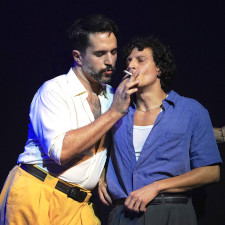
|
Beate Hein Bennett Ecstasy and Agony “Not About Me” January 13 to February 5
Upon entering the theater space the audience sees a large video image of the pre-2001 World Trade Towers flanked by a hovering golden-pink cloud while some indistinct low volume disco type music is playing. Suddenly a rather raunchy gay club scene takes over the video screen and a group of young men bursts upon the scene in a bacchanalia of gay love, some dancing alone, some in a tight embrace. On cue all collapse on the floor, some raucously laughing. Eduardo Machado’s memoir play, “Not About Me” evolves from this set-up into an elegy to friends whom he lost over the years to AIDS, and a soul-searching journey about his own identity as a bisexual actor and playwright of Cuban origin. What is autobiographical and what is invented is immaterial—the history of the AIDS epidemic implies drama a priori. The play is set “somewhere between here and there, sometime between now and then.” And much tragedy befell the gay community and the city of New York between “then” (1986) and “now,” with another ravaging epidemic. The central character is Eduardo, a man in his late 20s. In scene after scene he trips ecstatically on Ecstasy, or collapses in profound depression about his quest as actor and playwright, who tries to find his place in the 1980s theater world of New York and/or Los Angeles, where his wife lives and works. He appears to be financially carefree, perhaps supported by his wife. His quest as a theater artist is infused with his quest for bi-sexual adventures. He reels from love affair to love affair, some deeply passionate, as with his director/lover Gerald, and some being more about friendship, as with Tommy who is the peace maker among the volatile group of five friends that includes acerbic Frank and quiet Paul. One older female character, Marjorie, a famous actress in LA, is an important artistic influence on Eduardo, mentoring him in his acting and encouraging his playwriting which she sees as his real talent. Donna, a young aspiring actress married to an abusive Frenchman, arouses his love interest. He will also lose both women: Marjorie to liver cancer, while Donna becomes a “born-again” Christian and leaves her acting career. Eduardo Machado has directed a talented and spirited cast on stage and the film clips of various club and intimate scenes that are inserted into the stage action. Mark Marcante designed the stage space with a few movable set pieces, allowing for variety in movement. Alex Bartenieff’s gorgeous lighting design and David Margolin Lawson’s sound design of 80s disco music create the atmosphere, while Kelsey Charter’s costume design lends each character a distinct personality. A kudo goes to the cast which performs with empathy and grace the highs and lows in the life of this group of friends. First of all, Mateo d’Amato, a mercurial Eduardo, is captivating as he reels lithely from a high on Ecstasy and in pangs of love to being in a state of cold terror, fearing failure as an actor, a playwright, a lover, a husband, and even as a Cuban. His most straightforward moments are in scenes with his mentor, Marjorie, an older woman, played with beautiful sensibility by Sharon Ullrick. As they rehearse a text from Tennessee Williams’s one-act play “Talk to Me Like the Rain”-- a text that echoes their relationship-- she is able to draw the young man out; with her coaxing he reveals his inner turmoil while she encourages him to accept his bisexuality and to pursue his theater dreams. The other female character, Donna is played by Heather Velasquez: her delicacy and strength enchant Eduardo in the first part of the play but her comic talent as the born-again evangelical in the second part is spot-on. Charles Manning as Tommy plays the loyal and courageous friend, a support through all the storms. Michael Domitrovich as the cautious but enamored Gerald, an aspiring theater director, and Eduardo’s “flame” and director of Eduardo’s play has to figure out if he is being manipulated or if the relationship is truly one of love. And then there is the “flaming queen” Frank, played by Ellis Charles Hoffmeister with virtuoso acerbic wit and physical flamboyance; in the second part he speaks the cruel truth to the fact of what it really means to be an outsider living on the existential edge. Drew Valins as Paul, Frank’s lover and final companion, plays the counterpoint to Frank; Paul suffers quietly the cruelty of the promiscuous gay life, so pervasive in the early days of the AIDS epidemic when no one knew what the illness was, how it spread, and how fatal it would turn out to be. The first part ends with the entire ensemble singing the rousing
chorus from Brecht’s “The Rise and Fall of Mahagonny,”
“Oh show us the way to the next whiskey bar, if we don’t
find the next whiskey bar, I know that we must die, and if we don’t
find the next pretty boy, I know that we must die” The irony
is not lost. The second part ends with Eduardo bereft of his friends
and of Marjorie; he is alone on stage, facing the present pandemic.
The title of the play, “Not About Me” is doubly ironic—yes,
the play IS about Eduardo Machado but it is also about the larger
canvas of coming of age in times of devastating global pandemics
that continue to destroy our social fabric. |
| recordings | coupons | publications | classified |

